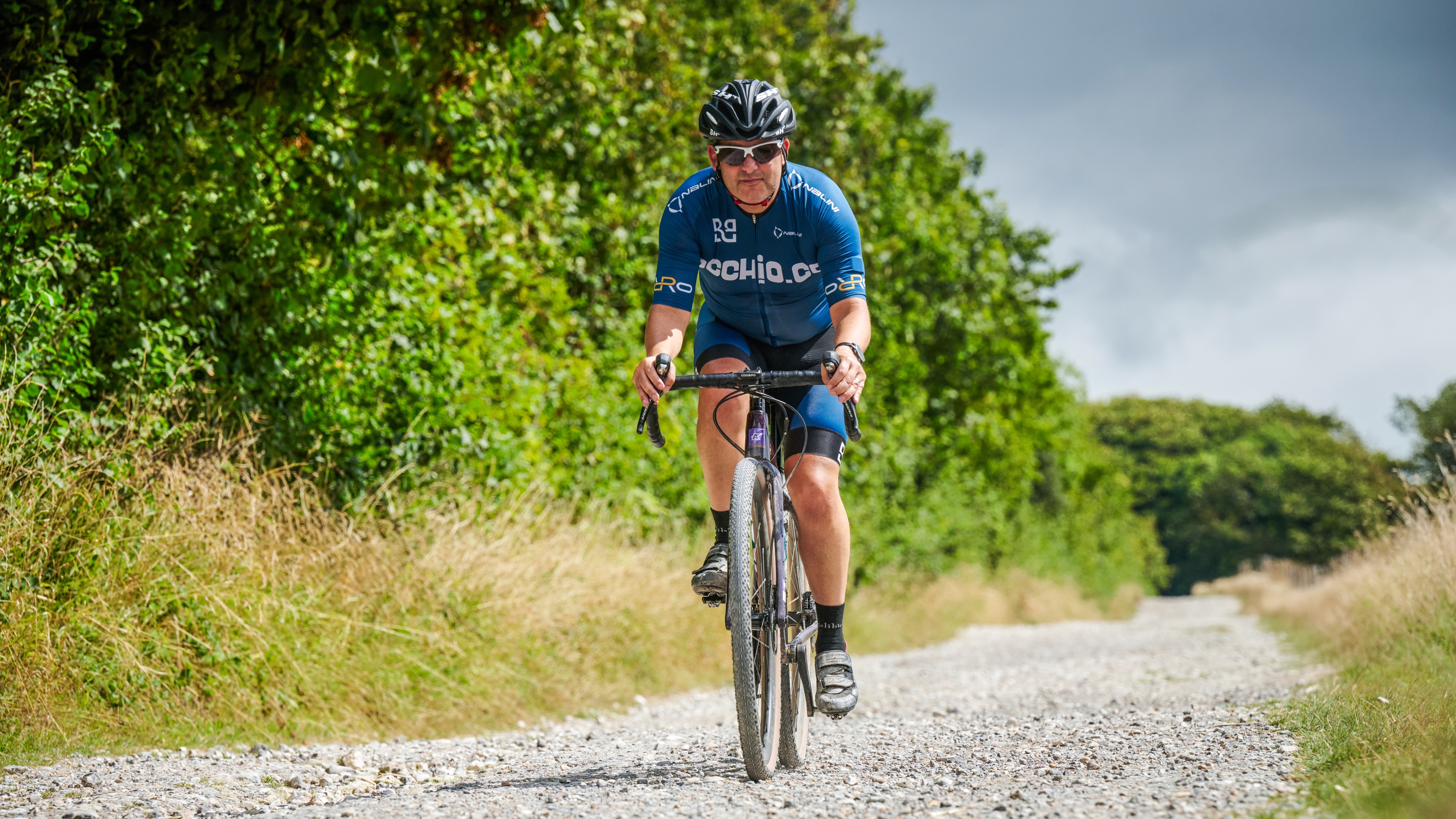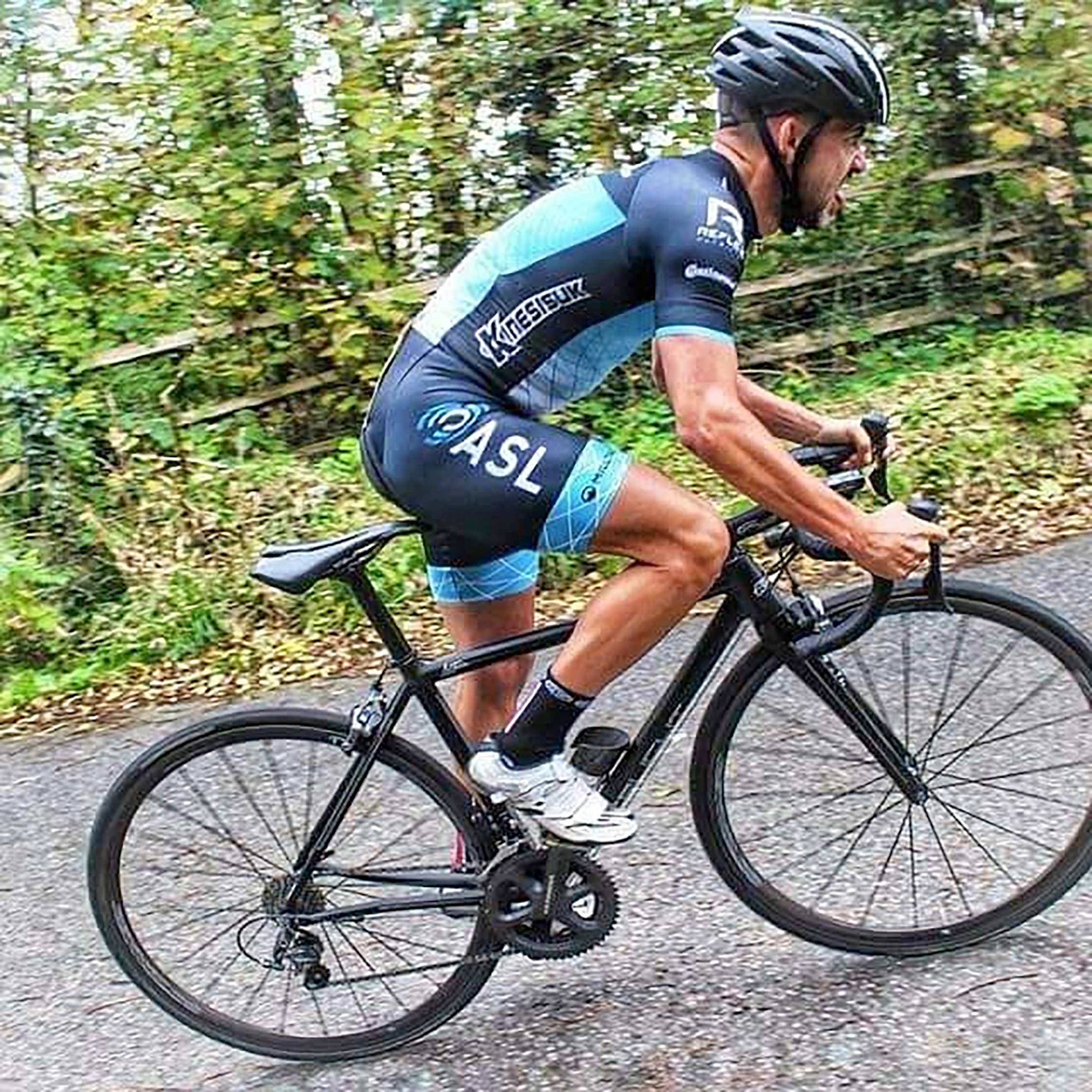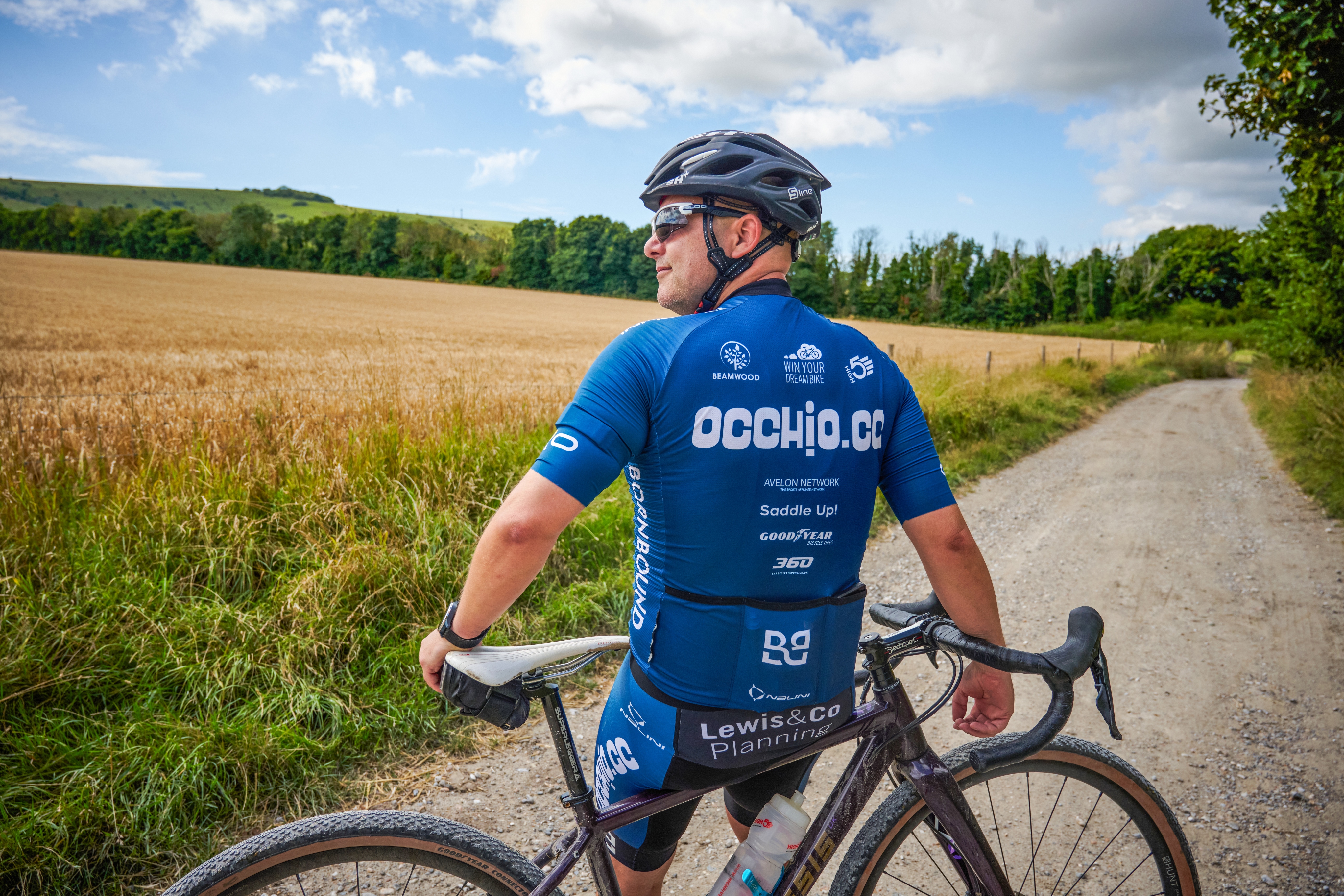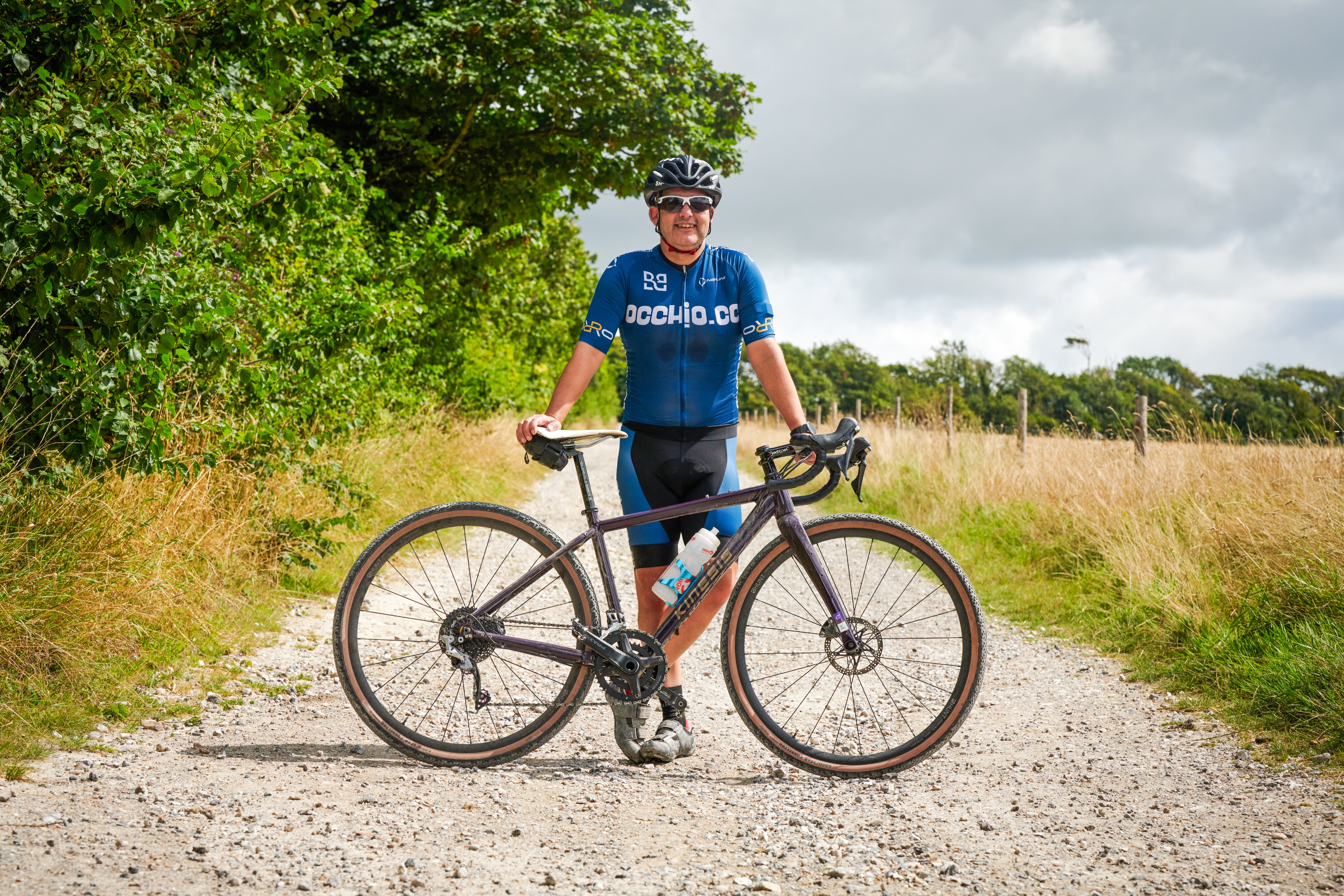
John Powell was lying in a field on the South Downs, in East Sussex, drifting in and out of consciousness. He managed to hold his phone to his mouth to speak to his wife, Annalisa, who was at home with their two young sons. “I told her I’d had a cycling accident and wouldn’t be coming back home. I said goodbye to her,” says Powell, reflecting on the life-changing event of September 2020. The amateur racer and organiser of the annual domestic race, the Tour of Sussex, had somersaulted into a field and landed hard on his back, puncturing his right lung and breaking several ribs.
Powell’s condition improved over the following days, but things were about to take a turn for the worse. Three weeks later he was rushed to Guy’s Hospital in London to receive emergency treatment for a strep B infection. “I protested,” Powell recalls, “that I was going home, but the doctor said, ‘if you go home, you won’t survive. The infection is that serious’.” Four years on, and despite being beset by persistent back and ankle problems, Powell rode up Alpe d’Huez this summer and even has his sights set on pinning on a race number once more. “I won’t see the front of the peloton again, but the fact I’m still alive and well enough to have the option is the biggest victory,” he says.
Let loose after lockdown

Powell, who is now 46, had begun racing aged 13 and reached cat-two level. “I almost got to first-cat, but spent the majority of my racing career as a third-cat,” he says. “I was quite aggressive in the bunch: if there was a gap, I’d take it. I had a handful of race wins and a lot of top-10s.” That ill-fated ride four years ago had been intended as a 35-mile spin on mostly gravel tracks near the Brighton (South of England) coast with his friend Nick Sturman. “We’d just been let out of lockdown and the plan was an easy ride with a pub stop,” Powell recalls. It was a loop he had ridden many times. “I’d got very comfortable with the route,” he says, “and when we approached a descent towards the village of Firle, I thought, let’s have some fun and go flat-out.” But danger lurked. “Just as I got to top speed, I noticed the field next to me had been recently ploughed, and big lumps of rock and earth had been spat out onto the track.”
Without time to react, Powell hit some of the debris, flew through some bushes, hit a wall and landed heavily in the field. “I remember the crash crystal clear,” he says. “Nick came screeching to a halt, asking if I was alright,” Powell relives the impact. “I said, ‘I think I’ve broken my–’ and that was it. No more words came out, as I was struggling to breathe. Then I passed out.” Sturman rushed to his friend’s aid, and thinking that he’d fractured his collarbone, put Powell in the recovery position on his left side. “Unbeknown to him, I was now lying on the lung that still worked, so now I couldn’t breathe at all,” Powell recounts. “I could see stars, and Nick was slapping me, saying ‘Don’t go to sleep, John’.”
Sturman called an ambulance, and used What3words app (see boxout) to identify the precise location. As they waited for the paramedics, a dog walker who happened to be a nurse helped keep Powell conscious and breathing as the oxygen levels in his body continued to fall. The site of the crash was too remote to access by land, so medical assistance arrived by helicopter. “The air ambulance doctors gave me oxygen, morphine and stabilised me there on the ground,” Powell recalls.
Surveying the damage

“If it wasn’t for Nick Sturman being with me and having the foresight to use What3words, I would have died,” says John Powell. Invented in Hertfordshire in 2013, What3words is a free geocoding app that has divided the world into 57 trillion three-by-three-metre squares, giving each one a unique combination of three words. After dialling 999, the caller informs the emergency services of their location’s three words. “Everyone out there who goes cycling, walking, camping, does anything outdoors, should have it downloaded on their phone,” implores Powell, “because you never know when you might need to describe an exact location to the emergency services.” The free St John’s Ambulance First Aid App is also recommended by medics, and Powell encourages riders to donate to their local air ambulance. “Each trip costs around £4,600 and they rely on public donations. Please help them if you can,” he says.
Once admitted to Brighton hospital, Powell was informed that because his cleats hadn’t unclipped from his pedals during the fall, he had had a self-crush accident – essentially folding himself in half, pushing the ribs inwards, puncturing his lung. He seemed to be recovering well in the first few days, but then doctors noticed a deterioration. “One said to me, ‘What on earth has happened to you? You’ve gone from walking around and being perky to looking terrible’.” Powell soon found out that he had contracted strep B, a bacterium that usually exists harmlessly in the intestines and lower genital tracts but which can be dangerous if it spreads to other parts of the body. He was given generic antibiotics, a standard protocol.
“When I’d first entered the hospital, they had to cut open my chest and put a tube between the lung and the chest wall, so that every time I took a breath, air came out of the lung,” Powell explains, “but we think they didn’t clean my skin and thus I got infected.” He was kept in the ward alongside dying Covid-19 patients for another fortnight, and grew increasingly agitated. After two-and-a-half weeks, a consultant walked into Powell’s room and was surprised to see him still there. “He read through the notes, disappeared and came back animated. ‘Mr Powell, the treatment isn’t working, I need to send you to Guy’s Hospital who specialise in these types of problems and they’re going to operate on you’, the doctor said.”
Powell was determined to return home to his wife and children, but the doctor insisted and he was rushed to London by air ambulance. “The infection hadn’t got into my blood, but it could have,” explains Powell. “I had to sign a load of papers acknowledging that the surgery might not work and I might not wake up.” Powell successfully underwent a three-hour-long open chest surgery where medics deflated his lung to remove the infection. A week later, he was finally allowed to return home, albeit exhausted, weak and still very unwell. “I’d been 62kg with an FTP of 330 watts when I had the accident,” he says, “but now I needed help getting up four steps.”
Four years on

Eventually Powell made a full recovery, returning to work as a business consultant, but four years on he still has severe pain in his back and ankles, despite ongoing physiotherapy. “Because of everything, it triggered childhood PTSD and I developed serious depression,” he adds. Cycling, his identity, became his saviour. A month after leaving hospital, he was allowed to resume training: the first six weeks just light pedalling on the indoor trainer. Now back on the road, Powell will soon have special shoe plates fitted to alleviate his ankle pain, and admits to having days when he feels unable to leave the house, “paralysed with fear that it’ll happen again.” His confidence is slowly returning, and an adjusted bike position has helped him claw back his FTP to 290 watts. He’s now even considering a racing comeback. “Even if it’s just going around in circles for an hour at Goodwood [race circuit], it would allow me to finish my competitive career on my terms,” he says.
Pre-crash, he used to go on regular cycling holidays in the Alps, and describes riding up mountains as “the purest form of cycling – I just love it.” While in hospital, he was inspired by YouTube videos. “I said to myself: I’m going to get better so I can ride up Alpe d’Huez again.” He made it a reality this July. “My back was really hurting but my friend paced me up, telling me to aim for each of the 21 hairpins one by one.” He had known from the start he was going to be a long way off his 56-minute PB – it didn’t matter. “Eventually I got to the top in one hour, 45 minutes. I called Annalisa and cried my eyes out.”







